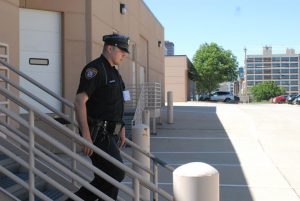IFPO Past Chairman Tom M. Conley, CPP, CPO, President & CEO of The Conley Group, Inc. was asked several months ago to write an article for Security Magazine by Editor-in-Chief Diane Ritchey. "That article has now been published this month’s edition of that magazine. I wanted to focus sharply on the IFPO and how the IFPO’s certification programs are a key part of the “guard industry”-to-“security profession” transition. I am honored to have been given the opportunity to write and submit this article." -- IFPO.
Words are a funny thing, and words matter. We use them to define objects, communicate ideas, and describe thoughts and feelings. While there are some words that have a nearly universal meaning, the meaning of other words varies greatly depending on who you ask.
For example, the words “law enforcement officer” conjures up a fairly common mental image of someone who is carefully selected, professionally trained, operationally competent and conducts themselves on a solid moral platform of honesty and integrity.
April Special: Professional Security Officer Program (PSOP) w/Individual Membership Package
The collective impression is that police officers can be depended upon by the public, seemingly without fail, to protect those who are in need or in trouble. The term “law enforcement officer” has a nearly universal meaning to all people irrespective of the agency type (city, county, state or federal) or the geographic location of the agency.
The same is true of most other bona fide professions. However, the meaning of the word “security” does not, by any stretch of the imagination, have any type of universal meaning. In fact, there are few other words in the English language that have so many different meanings and interpretations as does the word security. This vast difference in connotations needs to change.
The diverse associations and understandings of the word security is confusing to the public as well as those who are public safety professionals such as law enforcement officers, firefighters, medics, emergency managers, et al.
Find out how YOU can become a Certified Protection Officer with the IFPO!
As an example, when a homeowner states they have “security” at their home, what they likely mean is they have installed a fire and burglary alarm system. However, the term security may just as well mean that the homeowner has installed high-security locks on their doors and windows. Still to another homeowner, the installation of motion activated exterior lighting may mean that the homeowner has installed security at their residence.
In the business world, the varied meanings of the word security become far more complicated. Security to one business may mean that they have conducted a thorough risk analysis that has resulted in the implementation of perimeter gates, adequate lighting, a CPTED-devised environment, a card access system, alarm systems, high-security locks, a video camera system, layered internal physical barriers, professional on-site security officers, an excellent visitor control system, a tested business continuity plan, AEDs, robust IT security and an on-site emergency response team. Yet, the term security to another business may mean that they have passwords assigned for their desktop computers but have no other security measures, controls or systems in place.
Membership has its privileges! JOIN the IFPO and see the benefits!
It is almost as though the term security is a large bucket, and all things security or security-related get dumped in this large bucket. Physical security can and does also mean concierge, greeter, valet, ambassador, reception, janitor, facility specialists, watchman and many more duties that have little to do with security.
At least in the short run, organizational protection strategies have become even more confusing with the convergence of the virtual and physical security domains. When comparing the term “security” where anything and everything security related gets tossed into the bucket when compared to the earlier example of the universal meaning of “police officers,” it is no wonder there is so much confusion about security. The problem is this confusion is not only perplexing, but it can be dangerous because of the plethora of consequences of a security failure, up to and including the death of people.
The bit of good news is there are at least fairly solid industry and manufacturing standards, as well as some laws, covering devices and systems such as locks, lights, fencing, alarm systems, video systems, physical barriers, fire extinguishers, emergency medical tools, and defensive tactics devices. These industry and manufacturing standards create a sense of trustworthiness for the capabilities and dependability of most security hardware devices and components.
While security devices and systems need to be installed based on the results of a security and risk management survey, the fact is they will likely work effectively and as designed. Unfortunately, the same cannot be said about physical security personnel in terms of the wide variances existing between the selection, training, supervision and operational capabilities from one security organization to another. When the term security is used to describe private security personnel, trouble often follows with the public as well as the law enforcement community.
Read the rest of the story here.
Tom M. Conley
Tom M. Conley is the President & C.E.O. of The Conley Group, Inc., which is headquartered in Des Moines, Iowa. He has earned three university degrees and 13 professional certifications. He is a former civilian police captain and is a senior-level commissioned officer in the United States Navy (Reserve Component) where he is the recipient of more than 40 medals and awards including 10 personal decorations. In the U. S. Navy, he has served in a number of law enforcement, criminal investigation and information security leadership positions and is a certified U.S. Department of Defense counter terrorism instructor.


